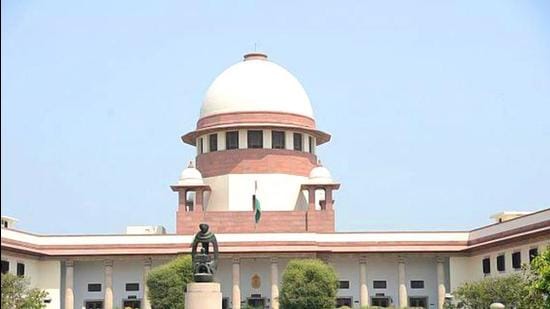Bar on transgender persons, others from donating blood: SC seeks govt’s response
Petitioner Santa Khurai, a Manipur-based Nupi Maanbi (traditional identity with the trans umbrella), challenged the constitutionality of clauses 12 and 51 of the guidelines that bar persons of gender and sexual minority groups as well as female sex workers from donating blood
The Supreme Court on Friday issued notice on a petition that challenges the Centre’s guideline for Blood Donor Selection and Blood Donor Referral, which prohibits transgender persons, men who have sex with men and female sex workers among others from donating blood.

Petitioner Santa Khurai, a Manipur-based Nupi Maanbi (traditional identity within the trans umbrella), challenged the constitutionality of clauses 12 and 51 of the guidelines that bar persons of gender and sexual minority groups as well as female sex workers from donating blood as they are “at risk” for sexually transmitted diseases like HIV (Human immunodeficiency virus), Hepatitis B and Hepatitis C.
Also Read | Supreme Court issues notice to Centre regarding soldier missing since 1997
The petitioner pointed out that the effect of these guidelines was felt the most during the past year when transgender persons were unable to donate blood to other members of their community during emergencies, and blood banks were also running low on supplies on account of fewer donations during the pandemic.
“The exclusion of transgender persons, men having sex with men and female sex workers from being blood donors and permanently prohibiting them from donating blood solely on the basis of their gender identity and sexual orientation is completely arbitrary, unreasonable and discriminatory, and also unscientific,” the petition stated.
“The guidelines need to be based on an individualized system for all donors based on actual and not perceived risk, and should not be based on identities,” the petitioner submitted.
A three-judge bench headed by Chief Justice of India (CJI) SA Bobde issued notice to the Union Health Ministry, National Blood Transfusion Council and National AIDS Control Organization (NACO) but refused to stay the guidelines.
“These are medical matters. We don’t understand it. We are not going to enter areas without understanding them,” the bench comprising Justices AS Bopanna and V Ramasubramanian, stated.
Arguing for the petitioner, advocate Jayana Kothari pointed out that the guidelines perpetuated stigma and furthered the discriminated faced by communities and persons based on their gender identities and sexual orientation.
“We have sought a change in the guidelines which are based on bands of identity, which is discriminatory, rather than on risky behaviour, which is not identity-based,” she said.
All blood units collected from donors were tested for infectious diseases including Hepatitis B and C as well as for HIV. Thus, such permanent exclusion on the basis of identity-based categories is “violative of the right to be treated equally as other blood donors,” the plea stated.
“The prohibition amounts to discrimination under Article 14 (right to equality) and Article 15 (right against discrimination) of the Constitution, as it deems them less worthy of social participation and healthcare,” said advocate Anindita Pujari who filed the petition.
The guidelines came into force in 2017, but the bar on blood donation is decades-old, said L Ramakrishnan from the public health non-government organisation Solidarity and Action Against the HIV Infection in India (SAATHII) that works with communities marginalized on account of their HIV status and/or gender and sexuality.
“Grouping entire populations as High Risk Groups (HRG) and ineligible for blood donations has two issues. One is that it perpetuates the social stigma already surrounding these populations. The other is that blood may donated by individuals who do not belong to these HRGs, but may still engage in high-risk behaviour. Given the acute need for blood donors in this country it makes more sense to move away from blanket bans but look at individualized risk similar to the new guidelines proposed in the United Kingdom, and to ensure that all blood is tested using advanced technologies that can detect HIV even when the viral load is low,” Ramakrishnan said.
The ban on blood donation by gender and sexual minority groups is a legacy of the AIDS pandemic that began in the 1980s and spread across the world, including in India, prompting the setting up of NACO and a phased-wise response to prevent the spread of HIV. However, several countries, including the UK and Brazil, have replaced these bans. In the UK, all men can give blood three months after engaging in sexual intercourse with another man. Earlier, they had to wait for a year from their last encounter.
Get Current Updates on India News, Lok Sabha election 2024 live, Election 2024 along with Latest News and Top Headlines from India and around the world.



